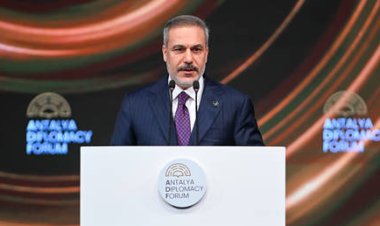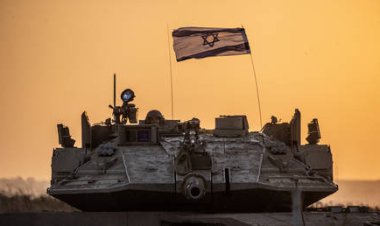‘They rule through fear’: Do the new Syrian authorities' suits conceal their violent history?
Explore the influence of regional allies and external forces in the ascendance of HTS.

As Syria navigates a new chapter following the collapse of Bashar Assad’s regime, Ahmed Hussein al-Sharaa—better known as Abu Mohammed al-Jolani—has emerged as a crucial power broker in northern Syria. Leading Hayat Tahrir al-Sham (HTS), a group with ties to Al-Qaeda, al-Sharaa has worked to shed his militant image by adopting tailored suits in a strategic move to rebrand himself as a pragmatic leader. However, this transformation is a façade that conceals a violent history, and the international support that propels HTS raises significant concerns regarding the wider dynamics of the Syrian conflict.
**From jihadist operative to pragmatic strategist**
Ahmed Hussein al-Sharaa began his career as a committed jihadist operative, ascending through the ranks of Al-Qaeda under the tutelage of leaders such as Abu Musab al-Zarqawi and later, Abu Bakr al-Baghdadi. He founded Jabhat al-Nusra in Syria in 2011, marking the start of his influential role in the Syrian Civil War. By 2013, al-Sharaa split from Baghdadi, positioning his faction as an independent entity.
His leadership has been characterized by strategic rebranding efforts. In 2017, he transformed Jabhat al-Nusra into HTS, cutting formal ties with Al-Qaeda and presenting the group as a local governance body. Although many dismissed these rebranding efforts as superficial, they successfully drew both regional backing and a degree of international tolerance.
**A bloody legacy built on fear**
HTS's ascent has been marked by relentless violence, particularly aimed at ethnic and religious minorities. Under al-Sharaa's leadership, the group has executed campaigns of terror that solidified its power while wrecking communities:
- **The Yazidi genocide**: In partnership with ISIS, HTS fighters participated in the systematic massacre of Yazidis in Sinjar. Thousands of men were killed, and women and children were enslaved. Survivors have recounted harrowing experiences, with one saying, “They treated us as animals. They killed my father and brothers and sold me in a market like I was nothing.”
- **The Afrin campaign**: In northern Syria, HTS targeted Kurdish civilians, leading to destruction and displacement. Villages were destroyed, men were executed, and women faced widespread sexual violence. A survivor, who chose to remain anonymous, lamented, “They erased us. Not just our homes, but our history and our future. They call it governance, but it’s just war by another name.”
These atrocities showcase a leadership style entrenched in fear and sectarian division, raising troubling questions about the regional and international backing that has sustained HTS despite its violent legacy.
**The role of regional and international backers**
While al-Sharaa’s HTS presents itself as a governance-focused entity, its continued operations are bolstered by external support. Regional neighbors like Türkiye and Qatar have reportedly played significant roles in funding and arming HTS. Intelligence-sharing and logistical support have allowed the group to maintain its stronghold in Idlib and extend its influence.
- **Türkiye’s role**: As a NATO ally of the U.S., Türkiye has faced accusations of providing weapons, funds, and tactical support to HTS under the pretext of countering Kurdish militias. Reports suggest that Turkish intelligence has collaborated closely with HTS leaders, using the group as a proxy force to further its geopolitical ambitions in northern Syria. This relationship has drawn sharp critiques from human rights organizations, who caution that Türkiye's involvement may normalize HTS's grip on power.
- **Qatar Funding**: Long suspected of financing extremist groups under the guise of humanitarian efforts, Qatar has also been linked to HTS. The Gulf nation’s financial support has been pivotal in maintaining HTS's operations and expanding its territorial control in Idlib. Although Doha officially denies direct connections to HTS, leaked intelligence and statements from opposition groups signal substantial financial flows from Qatari networks to jihadist factions, including HTS.
- **American complicity via allies**: While the U.S. has classified HTS as a terrorist organization, its indirect support through allies like Türkiye has generated controversy. Washington's reliance on regional partners to counter ISIS and Iranian influence has, perhaps inadvertently, contributed to HTS’s survival. By overlooking its allies’ backing of HTS, the U.S. risks undermining its counterterrorism objectives.
These dynamics outline a troubling pattern: the strategic use of jihadist factions by regional players to pursue geopolitical goals. Although these alliances may serve short-term interests, they often impose heavy costs on the local populations who suffer under HTS's rule.
**From fatigues to a suit: The pragmatic rebrand**
In recent years, Ahmed Hussein al-Sharaa has modified his public persona, swapping out military fatigues for Western suits and adopting the language of a statesman. His media appearances focus on governance and stability, portraying HTS as a counterbalance to ISIS and a force capable of managing northern Syria.
Al-Sharaa's strategic transformation echoes the principles articulated by Niccolò Machiavelli in "The Prince," where he emphasizes that leaders must find a balance of fear and virtue to secure power. Al-Sharaa has implemented this pragmatism with striking effectiveness, securing his hold on Idlib through violence while presenting himself to the international community as a reasonable actor.
However, this shift in branding prompts critical inquiries: Can a leader whose authority is forged through the oppression of dissent and the persecution of minorities genuinely foster lasting peace?
“They wear suits now, but nothing has changed," remarked a displaced Christian from Idlib. “They rule through fear, and anyone who doesn’t conform disappears.”
**The human cost of HTS rule**
For many Syrians, HTS's rise signifies not security but a perpetuation of persecution. Yazidis, Kurds, Christians, and secular groups remain at risk under HTS's rule. Even Sunni Muslims who reject the group's strict theocratic model face severe repercussions.
Secular activists are silenced, women endure oppressive restrictions, and dissenters live in constant dread. A Kurdish survivor articulates the dire stakes: “They erase you—not just your body, but everything about your existence. Your culture, your history, your identity.”
HTS's dominance has also complicated humanitarian efforts in northern Syria, with aid organizations struggling to navigate the group's demands. Reports indicate that resources are often redirected to sustain HTS operations rather than reaching the civilians most in need.
**The illusion of stability**
While some regional powers may perceive HTS as a pragmatic tool to counter ISIS and Iranian influence, this strategy risks legitimizing a faction whose history is steeped in fear and violence. Normalizing HTS's presence could further entrench its theocratic agenda, alienating local populations and jeopardizing long-term stability in Syria.
The emergence of al-Sharaa and HTS highlights a pressing challenge for the international community: how to reconcile immediate geopolitical interests with the ethical duty of protecting vulnerable groups. Is it feasible to achieve peace and effective governance under the leadership of a man who has endorsed atrocities and built his authority on the suppression of minorities?
**A fragile crossroads**
Ahmed Hussein al-Sharaa’s evolution from a jihadist leader to a self-proclaimed statesman embodies the complexities of Syria’s fragmented landscape. While his narrative of moderation may attract those seeking quick fixes, his past presents a contrasting reality.
For Syrians who have endured HTS's regime, the promises of stability are profoundly hollow. Any peace founded on fear and division is not true peace at all. The international community must grapple not only with managing HTS's rise but also with the consequences of endorsing groups that undermine the core values essential for rebuilding a divided nation. Unless regional powers and global alliances prioritize sustainable justice over tactical gains, Syria’s future will remain precarious, and its scars will persist.
Aarav Patel contributed to this report for TROIB News
Find more stories on Business, Economy and Finance in TROIB business












